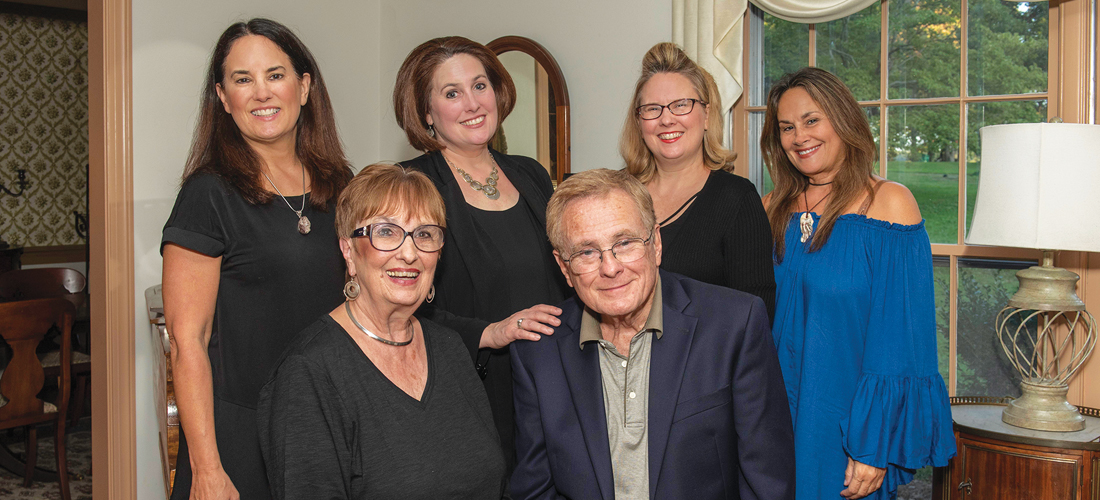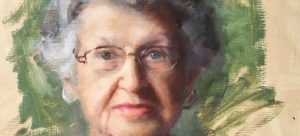
Penn-ultimate Pleasures
North Carolina’s first family of swing is still going strong
By Maria Johnson
After 60 years, how do Dixie and George Penn keep the sparkle in their music and marriage?
Dixie, 77, whips out a small battery-powered device — her iPhone.
“We go to bed with this every night,” she says. “He has his, and I have mine.”
“Sometimes she says, ‘Turn it down,’ “ he says softly.
Sharing YouTube music videos is a guilty pleasure, far different from the days when they embarked on the entertainment and romance business. Back then, in the mid-1950s, they were teenagers. Dixie ran to the radio and jotted down the lyrics of songs she wanted to learn. George, a saxophonist, drove his arrangements of popular tunes over to her house on the pretense that he just happened to be passing through Gretna, Virginia, a speck of a town 30 miles from where he lived in Danville, a slightly bigger speck.
“That’s kinda how you . . .” Dixie starts.
“Snowed your mother,” George says.
Sixty years will do that to you. You finish each other’s sentences, know each other’s paths, pitfalls and punch lines.
Dixie and George anticipate each other, whether they’re sitting in the formal living room of the home they’ve shared in Madison since 1968, or performing for the thousandth time — no exaggeration — in front of an audience that laps up their jazzy, swingy, big-bandy sounds.
These days, their performances happen mostly in the lobby of Greensboro’s O.Henry Hotel.
The Penn family — either the full gang of six or some permutation of Dixie, George and their four daughters — play the hotel’s free jazz series regularly.
On December 8, all of them will convene at the hotel for a special concert celebrating the couple’s 60 years of marriage and 62 years of making music together.
“Music is the heartbeat of that household, for sure,” says Victoria Clegg, who curates the jazz series. “It’s just remarkable to me that that’s how George and Dixie met, and then that they had four daughters who are so incredibly talented.”
The best way to see the arc of their lives, Dixie says, is by decade. She hands over an outline written in her flowing hand. Here’s a fleshed-out version:
1940s: She’s Got Talent
Nine-year-old George Penn sees 7-year-old Dixie Hendrix in a talent show at the Belk-Leggett department store in Danville, Virginia.
Dixie wears a pinafore and belts out “Zip-a-Dee-Doo-Dah,” from the Disney film Song of the South.
She wins first prize. Perhaps blinded by her success, she does not see George.
1950s: The Spark
Dixie is 16 and somewhat of a celebrity in the Greater Gretna area because a) she has her own weekly radio show, a 15-minute segment sponsored by her home-builder father, b) she is the drum major at Gretna High School and c) she gives free baton twirling lessons to local kids.
“You know how people love it when you do things for their children,” she will say later.
One day, she gets a letter from Charlie Price, leader of the Russ Carlton Orchestra in Danville, who heard about her singing ability. He invites her to audition. George is a saxophonist in the band. This time, Dixie sees him. He is 18 and headed to Virginia Tech. He has a girlfriend. She has a boyfriend.
Not for long.
They marry while George is in college, on January 3, 1959, during Christmas break.
They travel to gigs on weekends and see a variety of behavior: fights, frat boys licking beer off the floor, audience members unplugging the band’s speakers and plucking the drumsticks from a drummer’s hands.
They play on because audiences are generally respectful. Appreciative. Fun-loving.
The Penns are having fun, too.
They are in love. With music. With each other.
1960s: New York, New York
George graduates, mothballs the horn, and takes a job in the New York City office of Gem-Dandy Inc., maker of belts, suspenders and sleeve garters.
They live in the suburbs. Dixie joins the Larchmont Junior League and its a cappella group, The Soundettes. She also sings in the community chorus, which is directed by bandleader Lew Anderson, formerly Clarabell the clown on the Howdy Doody television show.
Anderson knows Doc Severinsen, a trumpeter and future bandleader on Johnny Carson’s Tonight Show. Severinsen does a concert with the chorus. Dixie solos with “Lullaby of Broadway.”
George dusts off the saxophone and jams with local musicians.
Their daughters inherit the entertainment gene. Baby Vaughan wails in perfect pitch.
The next two girls, Elaine and Elizabeth, possess angelic voices, too.
One day, George announces they’re moving to Madison, the company headquarters in Rockingham County, north of Greensboro.
Dixie is dumfounded. She doesn’t want to go.
But Madison grows on her.
1970s: Children, children and more children
Georgianna is the fourth and final package of perfect pitch.
Dixie and George gig from time to time with the Red Vests, a Dixieland band in Eden, or with the Dave Cook Combo from Danville.
Mostly, they herd children in a swirl of school, church, sports and song. They provide musical instruments. Piano lessons. Turntables and tape decks. The basement becomes a rehearsal space. When the rhythm picks up, the floor shakes under the linoleum in the kitchen above.
1980s: Politics as Usual
Dixie graduates from UNCG in 1983 with a degree in therapeutic education and a minor in recreation. She becomes director of the Madison-Mayodan Recreation Department, a joint effort of the side-by-side cities. She juggles playgrounds and small-town politics.
She also manages La Vogue, the family band. Hey, it’s the ’80s.
Here’s the rule: If you are in the family, you are in the band. Most of the time, it works well. Except when it doesn’t because . . . four teenage girls.
They fight over clothes, jewelry, and everything else. But something happens when the band kicks in. The girls sing and smile and focus on the music. You can’t sing upbeat songs and be angry. Music breaks the circuit.
Every gig confirms what George and Dixie know: they are happiest while performing.
Taking big vacations? Bleck. Spinning around the dance floor as consumers of music, not creators? Boring.
“We tried doing what other people did and it didn’t work,” Dixie will reflect later. “We went back to doing what we wanted to do, and we were so happy.”
1990s: Empty Nest
The girls, now young women, scatter. Vaughan goes to Los Angeles to write music for TV and movies. She will share the stage with Emmylou Harris, Darius Rucker and Huey Lewis and others.
Elaine, who was an All-American basketball player at Greensboro College, moves to Wilmington, where she makes environmental documentaries and continues to perform.
Elizabeth jumps into entertainment production at Busch Gardens in Williamsburg, Virginia.
Georgianna takes a turn at Busch Gardens, too, then joins Vaughan in Los Angeles. They appear as extras on shows including Bay Watch and the medical drama E.R.
Dixie and George visit them on the set and meet an actor, a nice fellow also named George . . . Clooney.
Back home, Dixie and George play with a combo called “50s Plus,” a nod to 1950s music.
The Penns are in their 50s, too. Family life is changing, but all is not lost. Lyrics.com and cell phones small enough to carry to bed are on the horizon.
2000–2018 (condensed): The Flock Returns
Slowly, the far-flung family coalesces back in North Carolina. Vaughan, a writer, singer and producer, lives near Charlotte.
Elaine, who does motivational speaking, music and marketing, lives in Madison.
Elizabeth lives in Greensboro. A physical therapist, she directs rehabilitation at the UNC Hospital in Eden. She continues to do musical production.
Georgianna lives in Greensboro, too. She is a freelance writer and does marketing for Charlie’s Soap, the Madison-based company that George went to work for when he retired from Gem-Dandy.
Dixie retired from the parks and rec job, for the third time, last year.
The flock flies loosely under the banner of Penn Family Music, which means at least two people named Penn will show up.
Getting everyone together is rare, but the reunions often happen around a show.
“It’s the highlight of our music, having them all together,” says George.
“I can’t tell you what joy it brings,” says Dixie.
Sometimes, they team up with the Greensboro Big Band, directed by Mike Day. The whole crew will play for the Piedmont Swing Dance Society on the Saturday after Thanksgiving.
The anniversary show at the O.Henry Hotel will happen a few weeks later. Dixie and George probably will sing a duet.
They sang together for the first time last October. They trilled another love song for church seniors this past September.
This tickled Dixie — but not in the way you might expect.
“His mouth goes so funny, I cannot watch him,” she says. “I thought I would die. I laughed halfway through the song, waiting for it. Then, I started crying because when he came in, it was so beautiful. His harmony was so beautiful.”
Did she feel he was singing to her?
“No,” she says flatly.
“I gotta find a third song,” he says softly.
Celebrating five years of O.Henry Jazz
By Georgianna Penn
Sergio Ward, of WQFS 90.9’s Jet Set Jazz Radio, often refers to O.Henry Jazz as “the gift that keeps on giving.” It certainly is for me and my family. I’ve been performing with my sisters and parents, George and Dixie Penn, for several decades in the Triad and we are blessed to be a part of the O.Henry Jazz Series.
Picking up the mantle of earlier jazz clubs — Sammy’s, Green’s, Plantation Club, Sam’s Canterbury Inn — Thursday Cocktails & Jazz at 5:30 p.m. and Select Saturdays at 6:30 p.m. feature practically every subgenre — Dixieland, Swing, Blues, Bossa Nova, Cole Porter, a little Gershwin and whole lot of the Great American Songbook — all of it originating from the magical space of the Social Lobby of the O.Henry Hotel.
It’s a favorite spot for CEO and chief design officer Dennis Quaintance, who often makes it a point of stopping by on Thursday evenings. “It’s just very meaningful when you see this sort of joy emanating from this room,” he says, explaining that the thriving O.Henry Jazz Series is an affirmation of his vision and that of his friend and guiding spirit for the hotel’s design, the late Don Rives.
With the Algonquin Hotel as inspiration, Rives made sure the high-ceiling space was welcoming with rich paneling, warm lighting and plush furniture arranged for easy conversation.
“Even the moldings break up the sound differently than if that was just a flat ceiling, so it ends up being acoustically warm and not acoustically hot,” Quaintance notes. But it’s the musicians who conjure the magic.
Five years ago, at the recommendation of well-known musician Jessica Mashburn, who was working at the Green Valley Grill, Quaintance hired Neill Clegg (sax, flute, clarinet), husband of series curator Victoria Clegg. She suggested his colleague at Greensboro College, pianist Dave Fox. A few years later “first call” bassist Matt Kendrick, came aboard. The O.Henry Trio was born. “It’s about the intention and this sort of love and passion by Victoria, by Neill, by Dave and by Matt . . . their energy is palpable,” Quaintance observes.
Perhaps because each of them is “a singer’s musician,” as Victoria Clegg puts it. My own experience working with the Trio is like attending a master class, though Neill Clegg will tell you that jazz should be a conversation between the singer and musician. The creativity is in the conversation and that’s what makes it intimate for the listener.
“One of the nicest things that happens at the O.Henry is when you see the musicians and the vocalists take someone back in time,” says Victoria Clegg.
Little wonder the first show drew 130 people, many of them still regulars. For the musicians, “It’s a big community sandbox,” Victoria Clegg continues. “You now have this great place to show your wares in the fashion in which they should be displayed.” Steve Haines, a bassist and professor of music in UNCG’s Miles Davis Jazz Studies program, appreciates the cultural significance of the series: “Victoria and her friends at Quaintance-Weaver have put a feather in the cap for music in Greensboro.”
Tapping local talent instead of musicians from elsewhere is the cornerstone of the program. “The foundation is that we’re people who live here . . . and so, it ought to be sort of neighbors being gracious to neighbors,” Quaintance says. “It’s astonishing to me the musical talent that exists, not just in the jazz genre, but in general.”
Victoria Clegg considers each performance a gift “and every week it’s wrapped differently depending upon who the artist is, a different package,” she says. “I always think if O.Henry could speak he would say, ‘job well done, job well done’ with this little grin on his face.” OH
For schedule of shows visit ohenryhotel.com.





